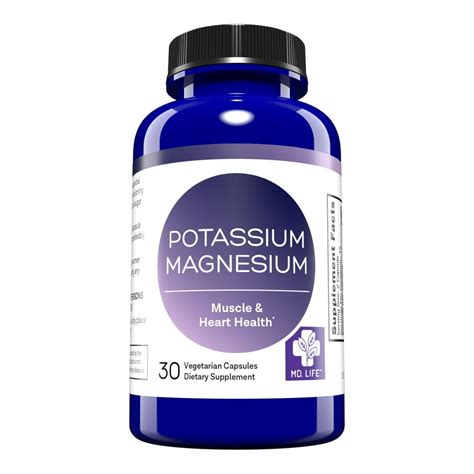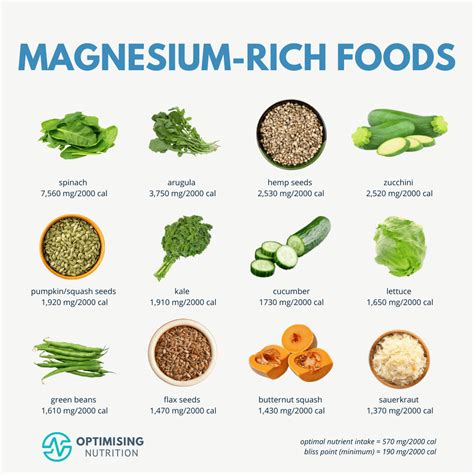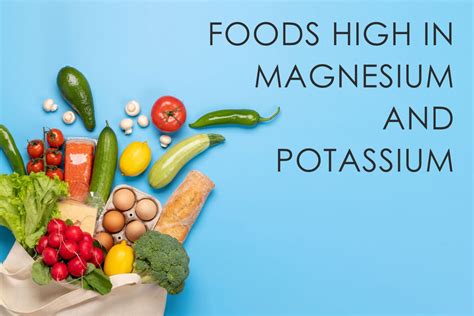Intro
Discover 5 foods rich in potassium and magnesium, including bananas, spinach, and nuts, to boost energy, lower blood pressure, and support overall health with these essential minerals and electrolytes.
When it comes to maintaining a healthy diet, there are several essential nutrients that our bodies need to function properly. Two of the most important minerals are potassium and magnesium, which play critical roles in various bodily functions, including heart health, muscle function, and nerve function. Unfortunately, many people do not get enough of these minerals in their diets, which can lead to a range of health problems. In this article, we will explore the importance of potassium and magnesium, and highlight five foods that are rich in these essential minerals.
Potassium and magnesium are both electrolytes, which means they help regulate the balance of fluids in the body. They are also both involved in muscle function, with potassium helping to regulate muscle contractions and magnesium playing a role in muscle relaxation. Additionally, both minerals are important for heart health, with potassium helping to lower blood pressure and magnesium helping to prevent irregular heart rhythms. Despite their importance, many people do not get enough potassium and magnesium in their diets, which can lead to a range of health problems, including high blood pressure, muscle cramps, and fatigue.
The importance of potassium and magnesium cannot be overstated, and incorporating foods rich in these minerals into your diet can have a significant impact on your overall health. In addition to their individual benefits, potassium and magnesium also work together to help regulate various bodily functions. For example, magnesium helps the body absorb potassium, and potassium helps the body regulate magnesium levels. This synergistic relationship highlights the importance of getting enough of both minerals in your diet. With that in mind, let's take a look at five foods that are rich in potassium and magnesium.
Potassium and Magnesium Rich Foods

When it comes to getting enough potassium and magnesium in your diet, there are several foods that are rich in these minerals. Here are five examples:
- Bananas: Bananas are one of the richest sources of potassium, with a single medium-sized banana providing around 422 milligrams of the mineral. They are also a good source of magnesium, with a single banana providing around 32 milligrams.
- Dark Leafy Greens: Dark leafy greens like spinach, kale, and collard greens are rich in both potassium and magnesium. A single serving of cooked spinach, for example, provides around 840 milligrams of potassium and 157 milligrams of magnesium.
- Nuts and Seeds: Many nuts and seeds are rich in magnesium, including almonds, cashews, and pumpkin seeds. A single ounce of almonds, for example, provides around 80 milligrams of magnesium.
- Avocados: Avocados are a rich source of potassium, with a single medium-sized avocado providing around 708 milligrams of the mineral. They are also a good source of magnesium, with a single avocado providing around 59 milligrams.
- Fatty Fish: Fatty fish like salmon and mackerel are rich in potassium and magnesium, with a single serving of cooked salmon providing around 534 milligrams of potassium and 59 milligrams of magnesium.
Benefits of Potassium
Potassium is an essential mineral that plays a critical role in various bodily functions. Some of the benefits of potassium include: * Lowering blood pressure: Potassium helps to lower blood pressure by balancing out the effects of sodium in the body. * Reducing muscle cramps: Potassium helps to regulate muscle contractions, which can help reduce muscle cramps and spasms. * Supporting bone health: Potassium helps to regulate the balance of calcium in the body, which is essential for maintaining strong bones.Magnesium Rich Foods

In addition to the foods listed above, there are several other foods that are rich in magnesium. Here are a few examples:
- Legumes: Legumes like black beans, chickpeas, and lentils are rich in magnesium, with a single serving of cooked black beans providing around 120 milligrams of the mineral.
- Whole Grains: Whole grains like brown rice, quinoa, and whole wheat bread are rich in magnesium, with a single serving of cooked brown rice providing around 86 milligrams of the mineral.
- Soy Products: Soy products like tofu and tempeh are rich in magnesium, with a single serving of cooked tofu providing around 60 milligrams of the mineral.
Benefits of Magnesium
Magnesium is an essential mineral that plays a critical role in various bodily functions. Some of the benefits of magnesium include: * Reducing inflammation: Magnesium has anti-inflammatory properties, which can help reduce inflammation and improve overall health. * Improving sleep: Magnesium can help regulate sleep patterns and improve the quality of sleep. * Supporting heart health: Magnesium helps to regulate heart rhythm and lower blood pressure, both of which can help reduce the risk of heart disease.Incorporating Potassium and Magnesium into Your Diet

Incorporating potassium and magnesium into your diet can be easy and delicious. Here are a few tips:
- Eat a variety of fruits and vegetables: Fruits and vegetables are rich in potassium and magnesium, so eating a variety of different types can help ensure you get enough of these minerals.
- Include nuts and seeds in your diet: Nuts and seeds are rich in magnesium, so including them in your diet can help boost your intake of this mineral.
- Cook with whole grains: Whole grains like brown rice, quinoa, and whole wheat bread are rich in magnesium, so cooking with them can help increase your intake of this mineral.
Potassium and Magnesium Supplements
While it is possible to get enough potassium and magnesium through diet alone, some people may need to take supplements to ensure they are getting enough of these minerals. Here are a few things to consider: * Consult with a healthcare professional: Before taking any supplements, it is essential to consult with a healthcare professional to determine the best course of action for your individual needs. * Choose a high-quality supplement: When choosing a supplement, look for one that is made by a reputable manufacturer and contains high-quality ingredients. * Follow the recommended dosage: When taking a supplement, it is essential to follow the recommended dosage to avoid taking too much of the mineral.Conclusion and Final Thoughts

In conclusion, potassium and magnesium are two essential minerals that play critical roles in various bodily functions. Incorporating foods rich in these minerals into your diet can have a significant impact on your overall health, and can help reduce the risk of a range of health problems. By following the tips outlined in this article, you can help ensure you are getting enough potassium and magnesium in your diet, and can enjoy the many benefits these minerals have to offer.
We hope this article has provided you with a comprehensive understanding of the importance of potassium and magnesium, and has given you the information you need to make informed decisions about your diet. If you have any questions or comments, please don't hesitate to reach out. We would love to hear from you and help in any way we can.
What are the benefits of potassium?
+Potassium helps to lower blood pressure, reduce muscle cramps, and support bone health.
What are the benefits of magnesium?
+Magnesium helps to reduce inflammation, improve sleep, and support heart health.
How can I incorporate potassium and magnesium into my diet?
+Eat a variety of fruits and vegetables, include nuts and seeds in your diet, and cook with whole grains.
